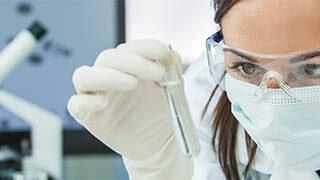Around 60,000 babies are born prematurely every year in the UK. Tragically, more than 1,000 of these babies die. Many others who survive a very early birth develop lifelong disabilities, such as cerebral palsy. Treatment with a hormone called progesterone can reduce a woman’s risk of giving birth early, but it doesn’t work for everyone.

Professor Mark Johnson, of Imperial College London, has been investigating whether combining progesterone with the asthma drug aminophylline (already used to help premature babies’ lungs develop) is effective in helping reduce the risk of premature birth.
The Action funded study looked at the combination treatment in the laboratory and in a feasibility study in pregnant women at high risk of preterm labour. The promising results have meant the work is moving another step towards a full clinical trial and the ultimate goal to stop babies from being born too soon, save their lives and improve their health.
The researchers are planning a full-scale clinical trial of a combination of two treatments, progesterone and aminophylline, aimed at preventing even more premature births. It is hoped this larger trial will start in 2022 and will help stop many babies from being born too soon.

